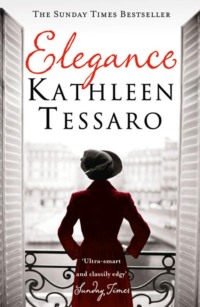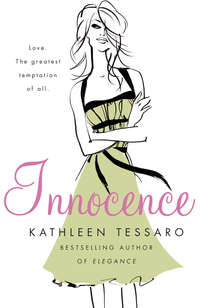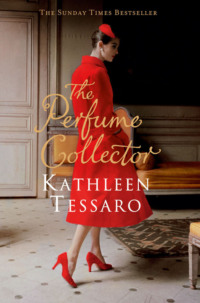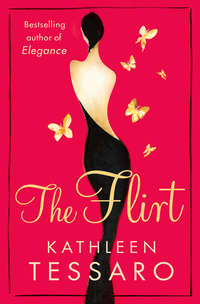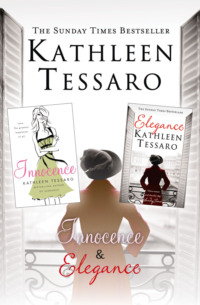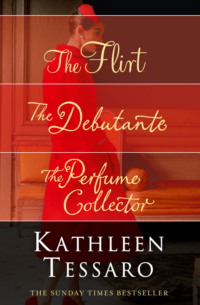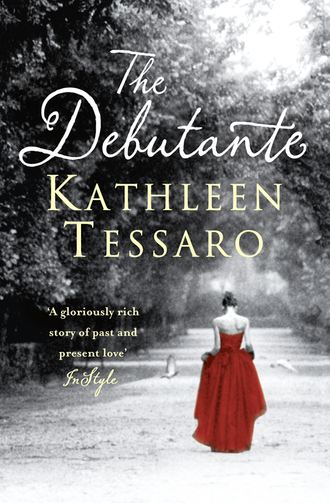
Полная версия
The Debutante
‘Why would I mind?’
He shrugged, trying to appear nonchalant. ‘No reason.’
Feeling self-conscious, he smiled and sipped, as if to prove that he was completely ignorant of her family history.
Cate frowned, unable to disguise her irritation. Rachel had obviously been talking. ‘It’s so hot in here!’ She turned away, looking out of the window.
‘You’re right. Let’s eat outside instead.’
‘Fine.’
Once out in the garden, the tension relaxed. It was good to get away from the heat of the kitchen with its ancient Aga. They sat under the chestnut tree again at the same low table where they’d had their tea, carrying the food out on trays.
A cool breeze rustled through the foliage. And suddenly, after the pleasant anonymity of working together for hours, the strangeness of being alone was palpable again.
‘So,’ Cate pushed her food around on her plate, ‘have you always been a valuer?’
It sounded dry and stupid.
Jack looked across at her. ‘No. You’re an artist, aren’t you?’
‘Yes.’ She hadn’t expected him to bat the conversation back at her quite so quickly.
‘What kind of work do you do?’
‘I paint. Reproductions.’
Up shot an eyebrow. ‘Really? You mean Whistler’s Mother and that sort of thing?’
She tore at a piece of bread. ‘I specialise in French and Russian eighteenth-century Romantic painting.’
‘The Enlightenment?’
‘Yes.’
He chuckled.
‘What?’
‘Rachel didn’t tell me you were a faker.’ He looked at her sideways. ‘Ever try to pass anything off?’
‘It’s all real,’ she said, jabbing the bread into a pocket of gravy. ‘It’s just not original. And yes, pieces get “passed off” all the time. Most of the work I do is for insurance purposes. Very few people can afford to lose a masterpiece, even a minor one, to theft or fire.’
‘I’ve offended you. I’m sorry. My mother always told me I had the social skills of a cabbage.’
‘I’m sure she was just being kind.’
He laughed. ‘Mothers are bound to be indulgent. So,’ he tried again, ‘why that period?’
‘I sort of fell into it.’
‘Into the Age of Reason?’
‘Someone asked me to do some work for them. A trompe l’oeil in a quite amazing flat overlooking the park. I found I had a certain aptitude for it. Also, there’s considerably more scope for economic success. After all,’ she took a bite, ‘if you hang a copy of Sunflowers on your wall, everyone knows you’ve got a fake. But if you choose something more elusive, unknown…’
‘Very clever. Was that Constantine’s idea?’
His astuteness caught her off guard. She shifted. ‘Well, the commission did come through a client of his.’
‘He’s always been, shall we say…enterprising.’ He took another sip. ‘And what about your own work?’
‘This is my work.’
‘Of course. I just meant your own subject matter.’
Again, she felt wrong-footed. ‘I get paid very well. And there’s nothing particularly worthy about starving to death in a garret.’
He said nothing. But his expression was amused.
‘This is more sustainable.’
‘Well, yes. We must do what’s sustainable.’
‘Have you always been a valuer?’ she asked again, crisply.
He looked up, grinning. ‘No. My father had an antiques business in Islington. I trained as an auctioneer at Sotheby’s one wayward year after university before I came up with the brilliant idea of becoming an architect. Then, unfortunately, my father became ill. Parkinson’s. And I took over the business.’ He paused. ‘I should’ve sold it and moved on; just been brutal and done it that same year. Instead, I got stuck.’
‘In what way?’
‘Pretending to be my dad, I suppose.’
‘You don’t like it?’
He shrugged his shoulders. ‘A job’s a job, right? And –’ he flashed her a smile – ‘at least it was sustainable. For a while, anyway. I was forced to sell a couple of years later.’
‘How is your father now?’
‘The truth is, it’s hard to tell. One day he’s quite bad and the next he seems like his old self. My mother is thinking of moving him to a nursing home. They live in Leicestershire now and I don’t see them as often as I’d like.’
‘And you never finished your training?’
He stabbed at a bit of salad. ‘I was married by then. To a girl who came into the shop to buy a mirror.’
‘I see. Did you sell her one?’
‘No, she couldn’t afford any. But I made her cups of tea and she used to stop in quite often on the pretext of finding one. In the end I gave her a really quite beautiful Edwardian overmantel.’ He smiled to himself, remembering. ‘I searched high and low for something decent I could afford to part with. I tried to act like I was going to give it away anyway. I don’t think she was fooled.’
‘But she married you. So it worked.’
‘Yes, it worked. I got the girl.’
‘But you sold the shop anyway.’
‘Turns out you need quite a lot of ambition to run your own business. After my wife’s death, I let it go.’ His eyes met hers. ‘She was killed in a car accident, two years ago.’
He said it simply; quickly. She wondered if he’d practised how to get it over with the least amount of emotion possible.
‘I’m so sorry.’
Cool air rushed around them.
‘Yes. Thank you.’
They ate in silence.
‘It’s strange, isn’t it?’ Jack put his fork down. ‘That’s what everyone says – “I’m so sorry.” And I say “Thank you”, like I was buying a pint of milk in a shop. It’s somehow…wrong, inadequate, that it should be reduced to that. And in the end, the whole thing gets reduced down to a single sentence. “That was the year my wife died.”’
She nodded. ‘The whole thing’s an absolute cunt.’
He looked at her in surprise. ‘Yes, well…that’s one way of putting it.’
‘I didn’t mean to offend you.’
‘It makes a change from people apologising.’
‘When my father died, I dreaded speaking to anyone I hadn’t seen in a while; going through the whole dance of clichés. It made me angry. At them, which of course was stupid.’
‘Were you close?’
‘He wasn’t exactly warm and fuzzy. But I don’t think it makes a difference. Mostly what I missed was the idea that one day it might be different. When he died the relationship became written in stone. It was too late to change it, even if I wanted to. Or could. And I was left, wandering around saying “Thank you” to a bunch of people who didn’t really want to talk about it and had no idea of what to say anyway.’
‘Yes,’ Jack conceded, taking another drink of wine, ‘it is a cunt.’
They watched a flock of house martins swoop in and out of the high hedges on the south side of the garden.
‘And what about you?’ He leaned back. ‘Married? Divorced? Widowed?’
She looked up sharply.
‘Or shall we leave all that?’
She stared at him a long time. ‘I’m…I was involved with someone.’
‘You have a boyfriend?’
‘It wasn’t quite so clearly defined.’
He raised an eyebrow. ‘You seem a little vague, Miss Albion.’
‘That’s my intention, Mr Coates.’
‘Do you instinctively balk at being defined, or simply in matters of the heart?’
‘Who said this was a matter of the heart?’
‘Well,’he laughed, ‘isn’t it?’
‘I’m not sure.’ She ran her fingers lightly along the rim of her glass. ‘There are so many more territories in the heart than one expects.’
‘Like what?’
‘Possession, power.’ She spoke slowly, softly, lifting her eyes to meet his. ‘It’s confusing sometimes, isn’t it?’
He felt his pulse quickening, the surface of his skin alive with increased sensitivity. ‘In what way?’
‘To tell which is which. They are intimacies, not so polite as love, but compelling just the same. Not everyone longs for tenderness.’
‘And you?’
‘I long for all sorts of things. Some of which I understand and some which I don’t.’
‘Are you saying you don’t know your own mind?’
‘Do you?’
‘I like to think I do.’
‘You’re deceived.’
‘And you’re presumptuous.’
‘What does the mind have to do with it anyway?’
‘I’m not referring to intellect but to intention,’ he clarified, aware that he was overcompensating with a certain loftiness of tone. She was clever and provocative. But it was the speed of her that was most thrilling.
Her lips widened in a slow, teasing smile. ‘And are all your intentions transparent and worthy?’
‘Isn’t that possible?’
‘Possible, perhaps. But not natural.’
‘And why not?’ He shifted, recrossing his legs. ‘Why can’t you be aware of your actions before you take them? Set your own course for your heart rather than blundering in blindly?’
‘My, you really are a rare breed!’
The wind tossed the thick boughs above them, elongated black shapes stretching towards them across the lawn.
‘That’s not fair. You make me sound like a prude!’
‘Well, let’s see. A man whose motivations and desires are completely known to him at all times and absolutely under his control, who never stumbles into the murkier depths of human relations, whose affections only follow his pre-sanctioned plans…No, you’re not a prude. You’re a statue. Something Olympian. Definitely marble.’
‘And what about you?’ he countered. ‘A woman who doesn’t know her own mind, can’t even tell if she’s having a relationship or not, but is only certain it doesn’t involve love. What does that make you?’
In the dimming light, a shadow fell across her, bathing her in darkness. ‘I don’t know. I don’t know what it makes me.’
The air felt suddenly cooler.
He tried to think of a way to backtrack without losing face. ‘Cate…’
But before he could, she pushed her chair back and stood up.
‘I’m tired,’ she said. ‘It’s been a long day. Do you mind if I…?’
‘Yes, go on.’ He said it a bit too quickly; his mind racing to figure out exactly how he’d offended her; certain that he was likely to do it again if he pursued the matter.
‘I’ll look after this.’
‘Thank you.’
She crossed the lawn, retreating from him, into the house, through the open French windows where the wind gathered and released the gauzy white sheers with invisible fingers.
The old house changed with the encroaching darkness. Rooms that were open and inviting in the daylight took on an unfamiliar coldness; shadows loomed and uneven floorboards sent her stumbling along the hallway. Although they were too far away from the shoreline, she thought she could hear the sea; surf crashing into cliffs.
Suddenly, her body felt leaden with exhaustion; her mind numb. The stairs groaned as she climbed up to her room. Without turning on the lights, she slumped on the edge of the bed. The last pink embers of sunset faded into the west. A minute later they were gone.
She picked up her mobile phone, lying on the bedside table. Two more missed calls. She was unable not to check it. Unable to return the calls yet unable to delete his number; unable to move forward in any way, trapped in an invisible cage of contradiction and obsession. She switched it off, tossing it across the room where it landed in a corner. Far away enough so that she couldn’t reach across and grab it in the night; close enough to be retrievable. Self-loathing swelled and saturated, bleeding silently through her, like ink across a clean sheet of paper.
She could see Jack’s blue eyes, narrowed, triumphant; hear the superiority of his voice.
What did that make her?
She knew all too well what that made her.
It still thrilled her. That was the most disgusting part. She dreaded the missed calls yet feared the day when there were no calls at all. Her motives were clouded, filthy. Nothing about her was clear or good or pure any more.
‘We’re bound, you and I.’ The memory of his voice, low, just above a whisper, his breath hot against her cheek played again and again in her mind. Without thinking she rubbed her forearm; she could still feel the pressure of his fingers, digging into her flesh when she tried to move away.
Twilight reigned. A pale sliver of moon began to rise.
It was an unknown house; veiled yet alive in the darkness. It sighed and trembled. Things shifted, shapes, half seen, darted across the floor.
And without even bothering to wash her face, brush her teeth or take her clothes off, Cate curled up on the bed and closed her eyes.
17, Rue de MonceauParis
20 July 1926
My darling Wren,
Well! Finally something interesting has happened here! Eleanor’s cousin has arrived in town–Frederick Ogilvy-Smith or Pinky, as he’s known, on account of his permanently flushed cheeks (they really do look like a freshly spanked bottom)–and he is the most fun, which is surprising, considering how congenitally dull Eleanor is. He’s on his way to Nice to join the Hartingtons at their villa near Eze but decided to stop a bit longer to take us all out to supper and a show. Of course Eleanor was mortified but he and Anne and I all got on brilliantly. Perhaps a little too brilliantly–tell me what you think. We are strolling out across the Place de la Concorde after leaving the Ritz and he takes my arm.
‘You’re the bread girl, aren’t you?’
‘I beg your pardon?!’ (I was trying to be serious and aloof but really there’s no point with Pinky–he just carries on regardless.)
‘Now don’t be coy. Everyone knows your mother married Lord Warburton of Warburton’s Wholesome Wholegrain. And a fine loaf it is.’ He looks at me sideways. ‘I expect I best woo you, now that you’re a famous heiress.’
‘I’m not famous.’
‘You will be.’
‘And I’m not an heiress!’
‘Yes, well, insanely well off then. Shall I do it now?’
I sigh. ‘If you must.’
‘Best get it over with.’ He takes his hands out of his pockets and puts on a wobbly sort of voice. ‘Your eyes are like two perfect blue–’
‘Please stop.’
‘Fair enough.’
‘What about Anne?’
‘What about her?’
‘Well, oughtn’t you woo her too?’
‘It’s not really how it’s done. Not strictly speaking. You’re meant to wait for one girl to go before you have a bash at another.’
‘We’re friends.’
‘I see.’ He turns to Anne. ‘Your eyes are like two perfect blue–’
‘Brown.’
‘Ah.’ He stops. ‘This is too complicated! Shall we all have a cocktail? A cigarette?’ He turns to me. ‘A kiss?’
And I did, darling–that is, let him kiss me. And before you become too livid let me explain that the thing about Pinky is he’s good fun and quite harmless. He’s more like a brother than a man and we were aching to find out what it was like. Besides, he kissed Anne too. There’s really no point in him kissing just one of us as we won’t have anyone to discuss it with later. We both agreed it was a bit wetter than we thought it would be and probably would’ve been nicer if it hadn’t been Pinky. He asked if he could write to me and I said yes. Already I’ve had a postcard of a goat and a rather suspect-looking peasant girl. And instead of the bread girl he’s taken to calling me Toast. Do you think we’re engaged?
Please don’t tell the Holy or I shall be forced to elope with a man I’ve only met once.
Piles of kisses from,
The Wayward (Libertine)
Jack took the plates into the kitchen, piling them into the sink. Mrs Williams would probably do them in the morning. He should leave them. Still, he turned on the water and squirted some sharply scented lemon washing-up liquid into the bowl, dunking his hands into the hot soapy water. Here at least he could make progress; change something. Doing the dishes was proof of a civilised world and a surefire remedy for existentialist angst.
Besides, he wanted to buy some time, put some space between them.
He’d intended to be witty, charming. Intelligent yet funny and unpretentious. But none of his carefully composed observations were required. The conversation had a life of its own that he hadn’t been able to control. He rinsed a glass clean under the tap.
He didn’t agree with her. Found her thinking flawed; a curious combination of honesty and elusiveness.
And yet she was undeniably compelling. When she moved, his gaze followed. When she spoke, he found himself leaning forward not just to hear what she had to say, but to catch what she didn’t; the spaces between her thoughts, which seemed to reveal even more. There was an unwilling transparency about her; a glassy fragility in spite of all her defences. His instinct was to protect it.
No wonder Derek Constantine was captivated. And he wondered again as to the exact nature of their friendship.
Some people were like viruses, infecting everyone they come into contact with. Derek Constantine was one of them. A fatal combination of glamorous tastes and plausibility, Constantine possessed a sleek moral dexterity masquerading as open-mindedness and sophistication that was almost impossible to resist. Why did he, of all people, have to be her connection in New York? Exactly what kind of clients did he introduce her to? Could he be the man she was referring to earlier? Jack tried to push the idea out of his mind, but it adhered itself to his imagination with unreasonable tenacity. He felt his jealousy twist into life, creating visions, scenes – Derek’s permanently tanned, manicured hand reaching to unzip Cate’s dress, his fingers travelling across her skin, his tongue darting, serpent-like, moistening his lips…
Jack reached into the soapy dishwater. ‘Damn!’
The tip of a carving knife jabbed his palm.
He rubbed it angrily under the tap. It wasn’t cut, just smarting.
He should be more careful – there was nearly always a blade beneath the water.
Jack stacked the last plate, folded the tea towel and hung it across the Aga.
Suddenly the weight of the day hit him; his resources not just depleted but gone.
He knew nothing, he reminded himself, yawning. Constantine could’ve been like a father figure to her for all he knew.
Then he spotted the wine bottle. Should he drain it down the sink?
He was thinking too much, as usual. Do nothing, leave it. Pushing the cork in, he turned out the lights.
Moving slowly through the hallways, he checked the doors, locking up. He imagined Cate upstairs, maybe sleeping already, and him below, going through the end-of-evening rituals. And for the second time that day he felt a pleasing swell of masculinity.
It was a beautiful house. Elegant, substantial; refined. A house that knew what it was and what it was doing. Once there’d been a whole Empire like that.
Jack tried to recall if he’d ever felt that way in his own life; that bright, hard sureness about who he was and where he was going. It existed. There was a time when he was first married that he felt in charge of his destiny; young, smart, capable of great things. He had only to conceive of a desire and he could achieve it. It was a wonderful, glorious feeling.
And then Fate intervened. This vast, self-determining power turned on him, without warning, and suddenly the godlike ability to steer his own course in life, free of any lasting obstacles or opposition, evaporated. Worst of all, he no longer possessed an inner compass. He was off, like a man suffering from vertigo. Instead he hesitated, floundered, fell. The tide that had pushed him so firmly towards achievement ebbed and he was compelled, by increments, to accept a life dictated instead by his limitations.
The accident had taken away so much; things that couldn’t be retrieved; pieces of himself that he hadn’t even realised existed until they were gone.
Most of all he missed that grandiose, cocky version of himself, striding boldly into the future. The truth was, he had liked himself for a while, and enjoyed his effect upon life. Now he preferred not to think of himself at all.
He and this old house had something in common: both were frozen in a time they thought would last forever; clinging to the memory of a past that was already faded, already gone.
Turning out the hall light, he climbed the stairs, groping through the darkness to his room.
The Bristol HotelParis
12 August 1926
My dear Irene,
I am sorry, my darling, to have given you such a fright. You must believe me when I say I didn’t mean to cause so much trouble. Anne and I simply wanted a little holiday and to meet with Pinky for a day or two and Madame Galliot took it all the wrong way, as usual. Of course there is no way she would’ve allowed us to go had she’d known, so we simply HAD to come up with a lie–only a little one. We told her we were visiting relatives of Anne’s for the weekend and then, really quite cleverly, composed the nicest little note in shaky old-lady handwriting asking for us to come which Pinky had posted from Monte Carlo the week before. It could only have been Eleanor who told her it wasn’t true. And then of course it all went horribly wrong. I am sorry, as I understand now that the papers picked it up–‘Peers’ Daughters Go Missing in Monte Carlo’. And before we knew it there was a full-scale search on! All the while we were completely oblivious, wandering around Villefranche with Pinky, eating ice cream.
What devastates is the thought that I’ve caused you harm, my love. Muv has already written a very stern letter, saying my actions have compromised your engagement prospects–can that really be true? Please know that I am silly, and stupid and selfish, but that I would never willingly hurt you–not for all the money in the world! I am too, too crushed! And now Madame Galliot refuses to have either Anne or me and Muv has drafted the Consort’s son, Nick Warburton, to bring me home like some defective goods. So now I’m waiting in the Bristol Hotel for him to arrive, under the beady eye of the concierge. I don’t even know what he looks like so shan’t recognise him and have cried so much my face is swollen and none of the waiters will serve me.
Please forgive me, darling! Please send me one small line to say you are still my sister and are still speaking to me! Surely your lovely Baronet will not abandon you just because you have an idiot in the family.
Oh dear. Some dreadful fat man has just walked in looking cross. That’s probably him. I think I shall cry again.
Yours, in floods,
The Prodigal D
Mrs Williams was not the gentle, grey-haired local woman Cate imagined. Coming downstairs in the morning to put the coffee on, she encountered a buxom bleach-blonde in her sixties, wearing jeans and a form-fitting pink T-shirt with the slogan ‘Big Spender’ spelled out in rhinestones. The radio was on, Madonna pounded out her latest dance tune. She was chatting, laughing away on her mobile while simultaneously chopping up vegetables.
Spotting Cate, she waved. ‘Oh, sorry! Gotta go. Call you later, OK?’
Whoever it was took no notice, rambling on without a break. Mrs Williams rolled her eyes and Cate smiled sympathetically. She gestured to Cate, pointing to the coffeemaker on the counter where a fresh pot had just brewed.
‘Look, Mum, I gotta go!’
Cate took a mug down from a shelf and poured a cup.
‘I’m going to speak to you later, OK? And never mind what he says. You just wait for me before you even think about the guttering, do you understand?’ She finally managed to hang up. ‘Sorry about that! My mother,’ she explained, wiping her hands on a tea towel. ‘I’m Jo, by the way.’


